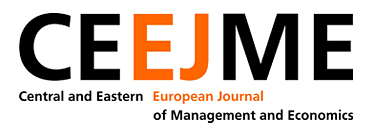 CENTRAL AND EASTERN EUROPEAN JOURNAL OF MANAGEMENT AND ECONOMICS
CENTRAL AND EASTERN EUROPEAN JOURNAL OF MANAGEMENT AND ECONOMICS
Vol. 2, No. 1, 43-54, March 2014,
WROCŁAW SCHOOL OF BANKING
Editor: Joost Platje
Contents: PDF download >>
Editorial: PDF download >>
Cover: PDF download >>
Vol. 2, No. 1, 9-16, March 2014
Non-typical values of financial ratios as signs of change processes in brewing sector businesses operating in Poland – a case study
Author: Krzysztof Łobos, Bolesław Goranczewski, Wrocław School of Banking, Poland
Article: PDF download >>
Abstract: The paper includes four case studies on brewing companies operating in the Polish market. The businesses were selected on the basis of non-typical values of various economic efficiency measures (ROS, inventory turnover, total debt ratio) revealed in their ratio analyses. Usually, non-typical ratio values are indicative of turbulent changes taking place in a business. Stabilisation of the above measures most frequently signifies recovery, while their variability may signal an imminent crisis or may accompany winding up a business.
Keywords: non-typical values of financial ratios, crisis phenomena, winding up, recovery, case study, brewing sector
Vol. 2, No. 1, 17-27, March 2014
Women about flexible work arrangements- interpretation of results of empirical research
Author: Dominka BĄK-GRABOWSKA, Wrocław University of Economics, Poland
Article: PDF download >>
Abstract: The paper addresses an issue of differences between Polish and international results of the research on the perception of work flexibility among women. The causes of the identified problem have been found in both terminology inconsistencies as well as the specificity of the Polish labour market including the existing legal system. Drawing conclusions has been based on findings of the international and national research including the pilot research undertaken by the author with respect of the perception of non-standard employment arrangements among Polish students.
Keywords: flexible work arrangements, non-standard employment arrangements, employment of women
Vol. 2, No. 1, 29-42, March 2014
Attempts at developing behavioural macroeconomics vs. modification of the homo oeconomicus model
Author: Krzysztof ORLIK, Wrocław University of Economics, Poland
Article: PDF download >>
Abstract: Among the foundations of the currently prevailing economic model is the assumption of rationality of decisions taken by a far-sighted and calculating human being – homo oeconomicus. However, the theory built on the basis of this assumption cannot embrace such phenomena as the economic crisis after 2007. Thus, new concepts are emerging such as behavioural macroeconomics that extend the current paradigm to include also irrational behaviours. The above issues are discussed most comprehensively by George Akerlof and Robert Shiller in their Animal Spirits that analyses such factors as confidence, sense of fairness, antisocial behaviour, the money illusion and stories dominating the public discourse. The above analysis paves the way for a new school of macroeconomics. This paper presents the above underlying assumptions against the background of an economic crisis.
Keywords: macroeconomics, economic theory, economic crisis
Vol. 2, No. 1, 43-54, March 2014
The use of Time-Driven Activity-Based Costing (TDABC) for calculating the costs of information processes
Author: Adam CZERWIŃSKI, Opole University, Poland
Article: PDF download >>
Abstract: The purpose of the paper is to present ways of applying Time-Driven Activity-Based Costing (TDABC) as an effective tool for evaluating the efficiency of information activities and processes. Measuring the costs of information and of information activities is difficult for a number of reasons. Therefore, information economics does not offer a separate concept or methodology for this type of costing. There is also a lack of suitable tools for assessing the value not only of information but also of information products. Time-driven activity-based costing may be used for measuring the costs of information processes. The paper demonstrates the above on the example of an “Request for Proposal (RFP) – offer” process that has been modelled as a network of activities. Then, time and labour resources required for the execution of the activities forming part of the process, as well as their drivers, have been identified. The above enabled to build time equations and cost formulas for the process. Using the above formulas, time and cost efficiency of the above information process for various customers were analysed. Then, it was possible to further study the impact of the cost structure of the labour resource on process efficiency.
Keywords: Time-driven activity-based costing, TDABC, cost of information, cost of information process, information process efficiency analysis
Vol. 2, No. 1, 55-64, March 2014
“Free riding” as a consequence of an agent’s adjustments to the publicly observed social involvement in the creation of the public good: the results of experimental research
Authors:
Rafał M. JAKUBOWSKI, Wrocław School of Banking, Poland
Paweł KUŚMIERCZYK, Wrocław University of Economics, Poland
Article: PDF download >>
Abstract: The paper describes the results of the experiments concerning sequential choices of economic agents, contributing to the creation of the public good. As based on the collected data, a model which explains the agents’ decisions as a function of publicly revealed average social contribution was constructed. Previous experiments and practice have shown that the average contribution of agents falls in the subsequent periods, which is typically explained as a consequence of rising agents’ frustration, resulting from the observation of the non-cooperative behaviour of other community members. The results described in this paper demonstrate that this is only partially true, as the increasing individual willingness to a free-ride is also observed in the situation when participants are misinformed about the growing level of the average social contribution. The paper concludes that an increasing tendency to free-ride is motivated by adjustments to average social contribution, as well as by the individual urge to maximize the short-term payoff.
Keywords: public goods, experiments, free-riding, sequential adjustments
